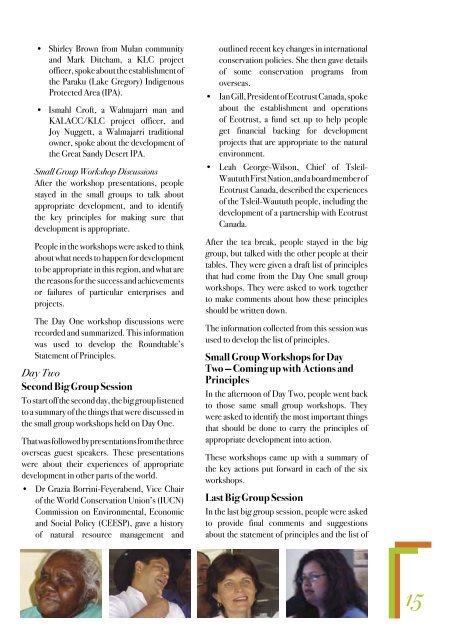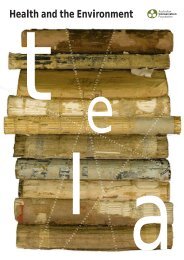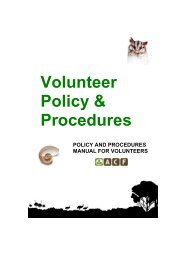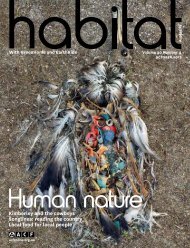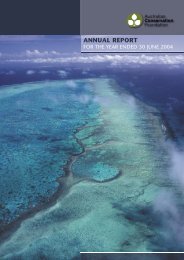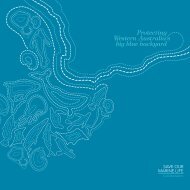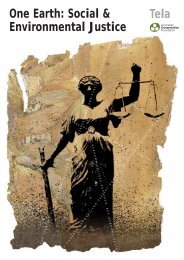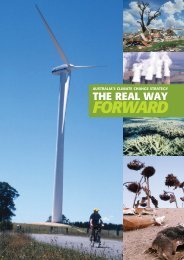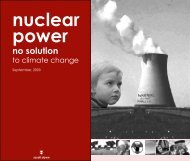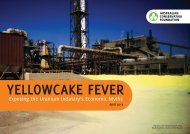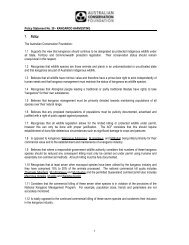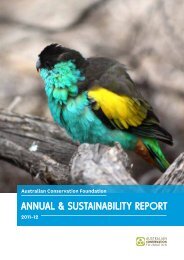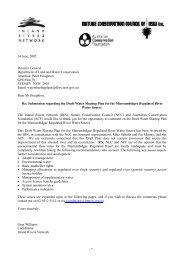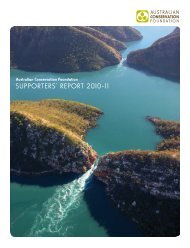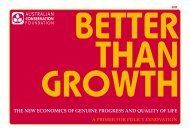Kimberley Appropriate Economics Interim Report - Australian ...
Kimberley Appropriate Economics Interim Report - Australian ...
Kimberley Appropriate Economics Interim Report - Australian ...
You also want an ePaper? Increase the reach of your titles
YUMPU automatically turns print PDFs into web optimized ePapers that Google loves.
• Shirley Brown from Mulan community<br />
and Mark Ditcham, a KLC project<br />
officer, spoke about the establishment of<br />
the Paraku (Lake Gregory) Indigenous<br />
Protected Area (IPA).<br />
• Ismahl Croft, a Walmajarri man and<br />
KALACC/KLC project officer, and<br />
Joy Nuggett, a Walmajarri traditional<br />
owner, spoke about the development of<br />
the Great Sandy Desert IPA.<br />
Small Group Workshop Discussions<br />
After the workshop presentations, people<br />
stayed in the small groups to talk about<br />
appropriate development, and to identify<br />
the key principles for making sure that<br />
development is appropriate.<br />
People in the workshops were asked to think<br />
about what needs to happen for development<br />
to be appropriate in this region, and what are<br />
the reasons for the success and achievements<br />
or failures of particular enterprises and<br />
projects.<br />
The Day One workshop discussions were<br />
recorded and summarized. This information<br />
was used to develop the Roundtable’s<br />
Statement of Principles.<br />
Day Two<br />
Second Big Group Session<br />
To start off the second day, the big group listened<br />
to a summary of the things that were discussed in<br />
the small group workshops held on Day One.<br />
That was followed by presentations from the three<br />
overseas guest speakers. These presentations<br />
were about their experiences of appropriate<br />
development in other parts of the world.<br />
• Dr Grazia Borrini-Feyerabend, Vice Chair<br />
of the World Conservation Union’s (IUCN)<br />
Commission on Environmental, Economic<br />
and Social Policy (CEESP), gave a history<br />
of natural resource management and<br />
outlined recent key changes in international<br />
conservation policies. She then gave details<br />
of some conservation programs from<br />
overseas.<br />
• Ian Gill, President of Ecotrust Canada, spoke<br />
about the establishment and operations<br />
of Ecotrust, a fund set up to help people<br />
get financial backing for development<br />
projects that are appropriate to the natural<br />
environment.<br />
• Leah George-Wilson, Chief of Tsleil-<br />
Waututh First Nation, and a board member of<br />
Ecotrust Canada, described the experiences<br />
of the Tsleil-Waututh people, including the<br />
development of a partnership with Ecotrust<br />
Canada.<br />
After the tea break, people stayed in the big<br />
group, but talked with the other people at their<br />
tables. They were given a draft list of principles<br />
that had come from the Day One small group<br />
workshops. They were asked to work together<br />
to make comments about how these principles<br />
should be written down.<br />
The information collected from this session was<br />
used to develop the list of principles.<br />
Small Group Workshops for Day<br />
Two — Coming up with Actions and<br />
Principles<br />
In the afternoon of Day Two, people went back<br />
to those same small group workshops. They<br />
were asked to identify the most important things<br />
that should be done to carry the principles of<br />
appropriate development into action.<br />
These workshops came up with a summary of<br />
the key actions put forward in each of the six<br />
workshops.<br />
Last Big Group Session<br />
In the last big group session, people were asked<br />
to provide final comments and suggestions<br />
about the statement of principles and the list of<br />
15


